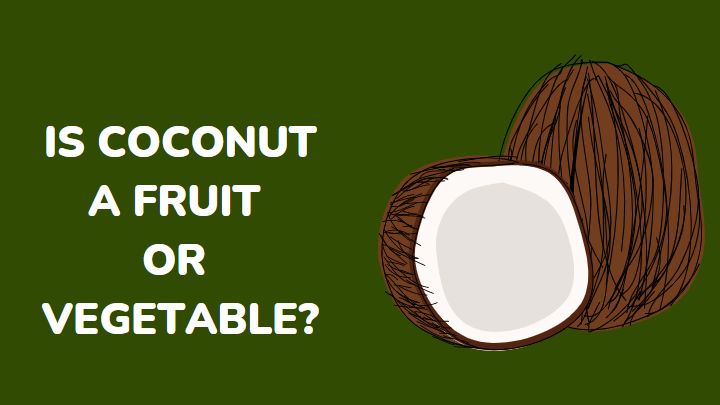If you love coconut and want to know if it’s a fruit or vegetable, you’re in the right place. Coconut is a fruit because it meets the botanical definition of a fruit, which is “a mature ovary that contains seeds.” It can also refer to the nut of the coconut palm tree.
If you’re still wondering if it’s a vegetable, the answer is no; as you read further, you will learn why.
What is coconut?
It is classified as a drupe, which is a type of fruit with a hard outer shell and a soft, fleshy interior. The exterior shell of the coconut is composed of the exocarp (outermost layer) and the mesocarp (middle layer).
The exocarp is generally thin and fibrous, while the mesocarp is thick and fleshy. The endocarp, or innermost layer, is where the edible meat of the coconut resides. This layer is also known as the “kernel.”
The coconut tree (Cocos nucifera) is native to tropical regions of Southeast Asia, India, and the Pacific Islands. The tree grows best in sandy, well-drained soils and requires ample rainfall or irrigation.
Coconut trees can grow up to 30 meters (100 feet) tall and are often grown in large plantations. They are a good source of food and income for people in tropical countries.
You can eat the edible part of the coconut fresh or dried and use the milk to make dishes like coconut rice. The oil from the coconut is also a featured ingredient in many beauty products.
Why is coconut a fruit?
Coconut is a fruit because it comes from the ovary of a plant.
Its palms grow in tropical climates and can reach a height of 30 meters. The fruit itself is large and round, with a hard outer shell and a white, fleshy interior.
Coconut water is a refreshing beverage that is high in electrolytes and low in calories.
You can also use it as a natural remedy for ailments like digestive problems, kidney stones, and hangovers.
Why is coconut not a vegetable?
Coconut is not a vegetable because it doesn’t fit the classification of vegetables.
Moreover:
- Fruits differ from vegetables in their taste. And coconuts are very sweet.
- Also, most fruits have seeds, while most vegetables do not, and coconut has a large seed in its center that is surrounded by edible flesh.
- Finally, fruits are often eaten raw, while vegetables are mainly cooked before eating.
Is coconut oil a fruit or vegetable?
Coconut oil is not a fruit or vegetable. It is derived from the meat of coconuts and serves various purposes, including skincare, cooking, and hair care.
Coconut oil is classified as a “dry” oil, meaning that it is high in saturated fats and low in unsaturated fats. This makes it a good choice for cooking, but it also means that it is not a good source of essential fatty acids.
Is coconut a berry?
Coconut is a drupe, not a berry. A drupe is a fleshy fruit that encloses a hard, stony seed. The term “drupe” comes from the Latin word stone or rock. Common examples of drupes include cherries, plums, peaches, and apricots.
Is coconut a nut or a fruit?
The term “nut” is often used more broadly to refer to any type of one-seeded fruit. In this case, coconut could be considered a nut, but it is not a true nut.
Benefits of eating coconut
Boosts the immune system
Coconut fruits contain lauric acid, which converts to monolaurin in the body. Monolaurin is known for its ability to fight off viruses and bacteria.
As such, consuming coconut fruits may help boost your immune system and protect you from illnesses.
Improves digestion
The fiber in coconuts can help improve your digestion by promoting regularity and preventing constipation. Besides this, the fatty acids in coconuts can help increase the absorption of vitamins and minerals in foods you eat.
Weight loss
Coconuts are a good source of medium-chain triglycerides (MCTs), which are a type of saturated fat. MCTs aid metabolism and promote weight loss.
Also, the fiber in coconuts can help you feel fuller for longer, preventing you from overeating.
It reduces inflammation
Coconut fruits contain anti-inflammatory compounds that can help reduce inflammation throughout the body.
Inflammation triggers many chronic diseases, like heart disease, arthritis, and cancer. And coconuts may help protect against these diseases.
Heart health
The saturated fats in coconuts can raise HDL (good) cholesterol levels while simultaneously lowering LDL (bad) cholesterol levels.
This can help improve your overall cholesterol profile and reduce your risk of heart disease.
FAQs
Is coconut good for diabetic patients?
Yes, it is. Coconuts have a good amount of protein and fiber, and their glycemic index is very low. A 55-gram serving of coconut will only give 4 GI, making it one of the best fruits for diabetes.
Is coconut water good for you?
Yes, it is. Coconut water contains sodium, magnesium, and potassium. It can help you stay hydrated.
Can you drink coconut milk if you’re allergic to nuts?
Yes, you can. Coconut is not a real nut. Unlike peanuts and tree nuts, coconut has rare cases of allergic reactions.
Conclusion
Coconut is a fruit, not a vegetable, but it is not like other fruits. It is a drupe, which is a type of fruit with a hard outer shell and soft inner flesh.
Coconut is unique, and you can use it in various ways, including as food, oil, and even as a building material.
So, the next time you want to classify a coconut, remember it is a drupe fruit and not a vegetable.
Thank you for reading.
If you loved this article, read more food guides here on Millenora.
